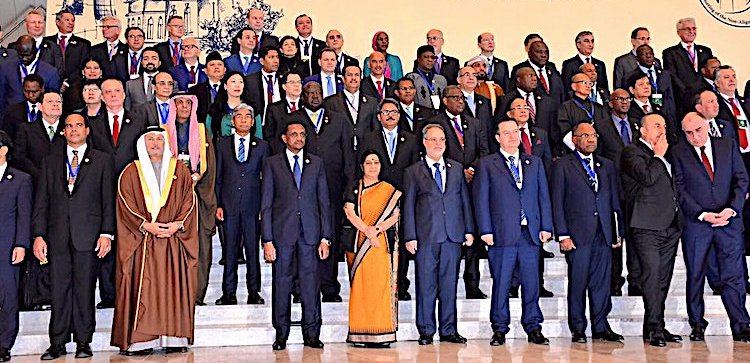By Santo D. Banerjee
NEW YORK (IDN) – Backing the 120-member Non-Aligned Movement (NAM), the International Institute for Non-Aligned Studies (IINS) has called for “comprehensive, transparent, inclusive and balanced” reform of the United Nations.
Recalling the final document of the 2018 NAM Ministerial Meeting held in Baku, Azerbaijan, the think tank emphasizes that the reform should be “pursued in an effective and accountable manner, fully respecting the political nature of the Organization as well as its intergovernmental, universal and democratic character, consistent with the UN Charter”.
IINS, based in New Delhi and with offices in New York, Geneva and Vienna, points out that NAM attaches significance to UN General Assembly Resolution 65/247 and 65/248 on the Human Resources Management and the United Nations Common System which finalized the establishment of the new contractual arrangements and harmonized the conditions of service in the field of the United Nations.
In accordance with these objectives, NAM has demanded reform of UN Secretariat and Management. NAM has stressed that the Secretariat should meet the highest standards of accountability, transparency, integrity and ethical conduct.
Pertaining to this, NAM has called for a better and more transparent recruitment process of personnel to the Secretariats of the organizations of the United Nations common system, while creating more opportunities to recruit young professional staff from developing countries.
In accordance with the UN General Assembly Resolutions, NAM believes that human resources management must play a central and strategic role in ensuring that an organization such as United Nations works in an integrated manner, says IINS.
“NAM strictly adheres to the notion that human resources management must continuously work to develop an Organization that is responsive and supports a culture of empowerment and performance, allows equal access to career opportunities irrespective of programmes and sources of funding and provides staff members with the chance to learn and grow so that they can reach their greatest potential,” notes the international think tank IINS.
With respect to recruitment and staffing, the above-mentioned Resolutions call on the United Nations Secretary-General to ensure that the highest standards of efficiency, competence and integrity serve as the paramount consideration in the employment of staff, with due regard to the principle of equitable geographical distribution.
The Resolution further recognizes that workforce planning should be considered an ongoing process, that the staffing requirements of the Organization are contingent upon mandates and that there is scope for the Secretary-General in forecasting future staffing requirements for major occupational groups, including the number of staff needed and the skill sets required.
“With respect to ensuring transparency in UN recruitment, NAM attaches utmost significance to performance management. Resolution 65/247 states that a credible, fair and fully functioning performance appraisal system is critical to effective human resources management,” notes IINS.
The Resolution also calls upon the Secretary-General to develop and implement measures to strengthen the performance appraisal system, in particular by rewarding staff for excellent performance and imposing sanctions for underperformance, and to strengthen the link between performance and career progression.
The think tank points out that a long-standing demand of Non-Aligned Movement has been to ensure equitable geographical distribution in UN management system and ensuring greater representation of the developing nations.
“Thus, NAM supports the terms of Resolution 65/247 that call for a comprehensive assessment of the system of geographical distribution. NAM believes that consultants to the UN should be drawn from the widest possible geographical basis.”
In particular, NAM supports the notion that staff members shall retain geographical status when serving against a geographical post, except those recruited under the young professional’s programme.
“Ensuring equitable gender representation in UN staff is also a prime concern. Hence, NAM fully supports the terms of Resolution 65/247 that calls on the Secretary-General to increase efforts to attain and monitor the goal of gender parity in the Secretariat, in particular at senior levels, and in this context to ensure that women, especially those from developing countries and countries with economies in transition, are appropriately represented within the Secretariat,” states IINS.
The think tank, established in September 1980, enjoys the Consultative Status with the United Nations Economic and Social Council (ECOSOC) and the Guest Status with the Non-Aligned Movement.
It also provides a platform, ‘NGOs FORUM FOR NAM” to various non-governmental organisation in NAM countries to give a people-oriented direction to the Movement, “thus making an exemplary contribution to the cause of the third world and developing countries”.
In view of the growing concern for Human Rights in all parts of the world, the IINS has established a CENTRE FOR HUMAN RIGHTS (CHR). The various divisions of the Centre for Human Rights encompass: Rights of Minorities and ethnic groups; Rights of the Women and Child; Right to Sustainable Development (Economic); Right to life, Democracy and Human Rights; Human Rights- Specific violations; and A principled Fight Against Terrorism. [IDN-InDepthNews – 08 April 2019]
Photo: Participants of the NAM Ministerial Meeting in Baku, Azebaijan. Credit: MEA India.
IDN is flagship agency of the International Press Syndicate.
facebook.com/IDN.GoingDeeper – twitter.com/InDepthNews
Send your comment: comment@indepthnews.colo.ba.be
Subscribe to IDN Newsletter: newsletter@indepthnews.colo.ba.be

